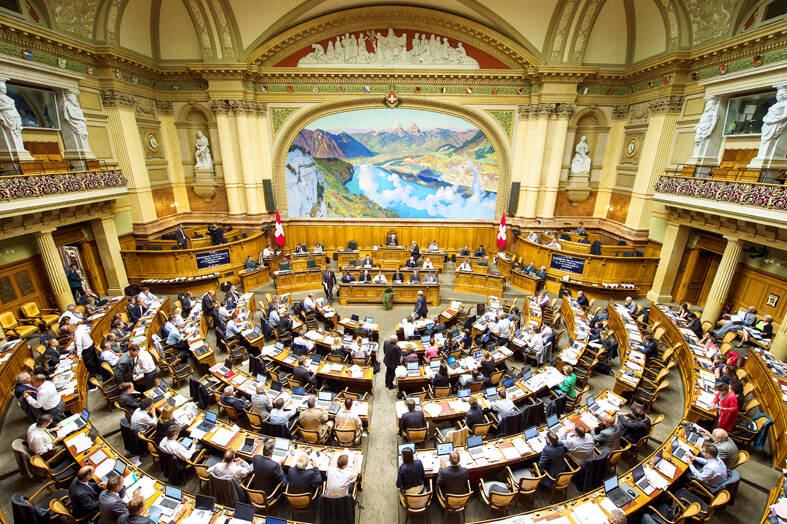The Swiss National Council on Wednesday passed a motion calling on the nation to sign an agreement with Taiwan to deepen collaboration in science, technology, innovation and culture.
The lower house of Switzerland’s parliament deliberated and adopted the bill submitted in 2022 by former Swiss national councilor Mustafa Atici in a vote of 96 in favor, 86 against and nine abstentions.
The bill aims to encourage and boost friendly relations between Taiwan and Switzerland, as well as deepen collaboration.

Photo: AP
It calls for a partnership agreement to be signed by the Trade Office of Swiss Industries in Taipei and the Cultural and Economic Delegation of Taipei in Switzerland.
In addition to collaboration between universities and research institutions in the two nations, a “solid institutional framework, in the form of an institutionalized partnership” is necessary to unlock the full potential that exists between the two sides in the interest of both parties, it says.
Deepening the relationship with Taiwan “can contribute to greater peace and stability in the world,” as “science diplomacy can help us meet the challenges of the 21st century,” the bill says.
It underlines the importance of developing the Swiss global network, in which “Taiwan has the potential to become one of the new major sites.”
Taiwan and Switzerland are “highly innovative, open economies that have a lot to offer,” especially in technology and research, said Swiss National Councilor Fabian Molina, who has taken over Atici’s motion after he lost his re-election bid in October last year.
The bill would help diversify Switzerland’s trade relations in Asia, improve the country’s economic and political relationship with Taiwan, and boost cooperation between democracies, Molina said.
However, Swiss Federal Councillor Guy Parmelin said that existing exchanges between Swiss and Taiwanese universities and institutions, as well as Swiss scholarship and subsidy programs, already “make it possible to achieve the objectives set” as he asked for the bill to be rejected.
The bill is to be sent to the Swiss Council of States, the upper house, for deliberation and voting.
Separately, the Wisconsin State Assembly passed a bill to reaffirm the US state’s commitment to ties with and support for Taiwan.
Taiwan shares the values of freedom, democracy, human rights, the rule of law, peace and prosperity with the US and Wisconsin, the bill says.
It urges Wisconsin to support the signing of a trade agreement between Taiwan and the US, as it is “an important step toward further strengthening bilateral trade” between the two sides by stimulating bilateral investment and collaboration through tariff reduction and other trade facilitation measures.
Wisconsin should also continue to back Taiwan’s participation in international organizations and “Taiwan’s aspiration to make more contributions in international societies,” it says.
Taiwan is capable of and willing to “collaborate with the world to face challenges such as humanitarian aid and disease control,” it says.
The bill was introduced in the State Assembly on Feb. 16, adopted on Thursday last week and sent to the Senate Organization Committee of the Wisconsin State Senate on Monday.

The CIA has a message for Chinese government officials worried about their place in Chinese President Xi Jinping’s (習近平) government: Come work with us. The agency released two Mandarin-language videos on social media on Thursday inviting disgruntled officials to contact the CIA. The recruitment videos posted on YouTube and X racked up more than 5 million views combined in their first day. The outreach comes as CIA Director John Ratcliffe has vowed to boost the agency’s use of intelligence from human sources and its focus on China, which has recently targeted US officials with its own espionage operations. The videos are “aimed at

STEADFAST FRIEND: The bills encourage increased Taiwan-US engagement and address China’s distortion of UN Resolution 2758 to isolate Taiwan internationally The Presidential Office yesterday thanked the US House of Representatives for unanimously passing two Taiwan-related bills highlighting its solid support for Taiwan’s democracy and global participation, and for deepening bilateral relations. One of the bills, the Taiwan Assurance Implementation Act, requires the US Department of State to periodically review its guidelines for engagement with Taiwan, and report to the US Congress on the guidelines and plans to lift self-imposed limitations on US-Taiwan engagement. The other bill is the Taiwan International Solidarity Act, which clarifies that UN Resolution 2758 does not address the issue of the representation of Taiwan or its people in

DEFENDING DEMOCRACY: Taiwan shares the same values as those that fought in WWII, and nations must unite to halt the expansion of a new authoritarian bloc, Lai said The government yesterday held a commemoration ceremony for Victory in Europe (V-E) Day, joining the rest of the world for the first time to mark the anniversary of the end of World War II in Europe. Taiwan honoring V-E Day signifies “our growing connections with the international community,” President William Lai (賴清德) said at a reception in Taipei on the 80th anniversary of V-E Day. One of the major lessons of World War II is that “authoritarianism and aggression lead only to slaughter, tragedy and greater inequality,” Lai said. Even more importantly, the war also taught people that “those who cherish peace cannot

US Indo-Pacific Commander Admiral Samuel Paparo on Friday expressed concern over the rate at which China is diversifying its military exercises, the Financial Times (FT) reported on Saturday. “The rates of change on the depth and breadth of their exercises is the one non-linear effect that I’ve seen in the last year that wakes me up at night or keeps me up at night,” Paparo was quoted by FT as saying while attending the annual Sedona Forum at the McCain Institute in Arizona. Paparo also expressed concern over the speed with which China was expanding its military. While the US